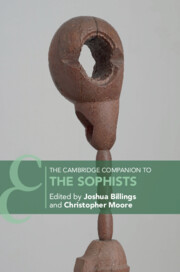Book contents
- The Cambridge Companion to the Sophists
- Other Volumes in the Series of Cambridge Companions
- The Cambridge Companion to the Sophists
- Copyright page
- Contents
- Contributors
- Note on the Text
- Introduction
- Part I Contexts
- Part II Thought
- 5 Nature and Norms
- 6 The Turn to Language
- 7 Problems of Being
- 8 Politics in Theory and Practice
- 9 Interrogating the Gods
- 10 Skills of Argument
- 11 Civic and Anti-Civic Ethics
- Part III Receptions
- Appendix: The People of the Sophistic Period
- Select Bibliography
- Index
- OTHER VOLUMES IN THE SERIES OF CAMBRIDGE COMPANIONS (continued from page ii)
7 - Problems of Being
from Part II - Thought
Published online by Cambridge University Press: 23 December 2023
- The Cambridge Companion to the Sophists
- Other Volumes in the Series of Cambridge Companions
- The Cambridge Companion to the Sophists
- Copyright page
- Contents
- Contributors
- Note on the Text
- Introduction
- Part I Contexts
- Part II Thought
- 5 Nature and Norms
- 6 The Turn to Language
- 7 Problems of Being
- 8 Politics in Theory and Practice
- 9 Interrogating the Gods
- 10 Skills of Argument
- 11 Civic and Anti-Civic Ethics
- Part III Receptions
- Appendix: The People of the Sophistic Period
- Select Bibliography
- Index
- OTHER VOLUMES IN THE SERIES OF CAMBRIDGE COMPANIONS (continued from page ii)
Summary
Sophists were active participants in ancient discussions about being or what-is at the most general level. This chapter discusses the contributions of Gorgias, Protagoras, Xeniades, and Lycophron in the context of the Eleatic philosophers Parmenides, Zeno, and Melissus. All of these figures share a serious commitment to ontological inquiry as well as a concern with the problems that arise when discussing being or what-is. They also share an approach to these problems that is at times paradoxical and self-undermining. The chapter begins with a brief discussion of Parmenides’ poem, a work that serves as an important backdrop for later ontology. It then covers Gorgias’ On Not-Being, a response to the Eleatics and a unique contribution in its own right. Gorgias’ work is then compared with that of Zeno and Melissus. Finally, the more limited evidence we have of Protagoras, Xeniades, and Lycophron’s ontological theorizing is discussed.
Information
- Type
- Chapter
- Information
- The Cambridge Companion to the Sophists , pp. 200 - 224Publisher: Cambridge University PressPrint publication year: 2023
